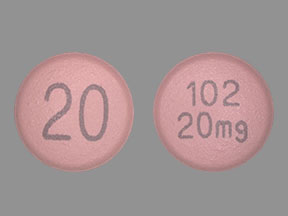Tipiracil / Trifluridine Side Effects
Medically reviewed by Drugs.com. Last updated on Oct 23, 2024.
Applies to tipiracil / trifluridine: oral tablet.
Precautions
It is very important that your doctor check your progress at regular visits to make sure that this medicine is working properly. Blood tests will be needed to check for unwanted effects.
Using this medicine while you are pregnant can harm your unborn baby. If you are a woman who can get pregnant, your doctor may do tests to make sure you are not pregnant before starting this medicine. It may also cause birth defects if the father is using it when his sexual partner becomes pregnant. Female patients should use an effective form of birth control during treatment with this medicine and for at least 6 months after the last dose. Male patients who have female partners should use effective birth control during treatment with this medicine and for at least 3 months after the last dose. If you think you have become pregnant while using this medicine, tell your doctor right away.
This medicine can temporarily lower the number of white blood cells in your blood, increasing the chance of getting an infection. It can also lower the number of platelets, which are necessary for proper blood clotting. If this occurs, there are certain precautions you can take, especially when your blood count is low, to reduce the risk of infection or bleeding:
- If you can, avoid people with infections. Check with your doctor immediately if you think you are getting an infection or if you get a fever or chills, cough or hoarseness, lower back or side pain, or painful or difficult urination.
- Check with your doctor immediately if you notice any unusual bleeding or bruising, black, tarry stools, blood in the urine or stools, or pinpoint red spots on your skin.
- Be careful when using a regular toothbrush, dental floss, or toothpick. Your medical doctor, dentist, or nurse may recommend other ways to clean your teeth and gums. Check with your medical doctor before having any dental work done.
- Do not touch your eyes or the inside of your nose unless you have just washed your hands and have not touched anything else in the meantime.
- Be careful not to cut yourself when you are using sharp objects such as a safety razor or fingernail or toenail cutters.
- Avoid contact sports or other situations where bruising or injury could occur.
Tell your doctor right away if you have severe or persistent diarrhea, nausea, or vomiting while using this medicine.
Serious side effects
Along with its needed effects, tipiracil/trifluridine may cause some unwanted effects. Although not all of these side effects may occur, if they do occur they may need medical attention.
Check with your doctor immediately if any of the following side effects occur while taking tipiracil / trifluridine:
More common side effects
- black, tarry stools
- bleeding gums
- blood in the urine or stools
- blurred vision
- chills
- coughing up blood
- dizziness
- fever
- headache
- hoarseness
- increased menstrual flow or vaginal bleeding
- lower back or side pain
- nosebleeds
- painful or difficult urination
- pale skin
- paralysis
- pinpoint red spots on the skin
- pounding in the ears
- prolonged bleeding from cuts
- red or dark brown urine
- slow or fast heartbeat
- sore throat
- trouble breathing
- ulcers, sores, or white spots in the mouth
- unusual bleeding or bruising
- unusual tiredness or weakness
Less common side effects
- bladder pain
- bloody or cloudy urine
- frequent urge to urinate
- muscle aches
- stuffy or runny nose
Other side effects
Some side effects of tipiracil / trifluridine may occur that usually do not need medical attention. These side effects may go away during treatment as your body adjusts to the medicine. Also, your health care professional may be able to tell you about ways to prevent or reduce some of these side effects.
Check with your health care professional if any of the following side effects continue or are bothersome or if you have any questions about them:
More common side effects
- change in taste
- decreased appetite
- diarrhea
- hair loss or thinning of the hair
- lack or loss of strength
- loss of taste
- muscle or bone pain
- nausea
- stomach pain
- swelling or inflammation of the mouth
- vomiting
See also:
For healthcare professionals
Applies to tipiracil / trifluridine: oral tablet.
Hematologic adverse events
- Very common (10% or more): Anemia (77%), neutropenia (67%), thrombocytopenia (42%)
- Common (1% to 10%): Febrile neutropenia[Ref]
Other
Gastrointestinal
- Very common (10% or more): Nausea (48%), diarrhea (32%), vomiting (28%), abdominal pain (21%)
- Common (1% to 10%): Stomatitis (8%)[Ref]
Respiratory
- Common (1% to 10%): Nasopharyngitis, pulmonary emboli
- Uncommon (0.1% to 1%): Interstitial lung disease[Ref]
Metabolic
- Very common (10% or more): Decreased appetite (39%)[Ref]
Cardiovascular
- Common (1% to 10%): QTc interval prolongation[Ref]
Nervous system
- Common (1% to 10%): Dysgeusia[Ref]
Genitourinary
- Common (1% to 10%): Urinary tract infections[Ref]
Dermatologic
References
1. (2015) "Product Information. Lonsurf (tipiracil-trifluridine)." Taiho Oncology, Inc.
More about tipiracil / trifluridine
- Check interactions
- Compare alternatives
- Dosage information
- During pregnancy
- Drug class: antineoplastic combinations
- En español
Patient resources
- Tipiracil and trifluridine drug information
- Trifluridine and tipiracil (Advanced Reading)
- Trifluridine and Tipiracil
Other brands
Professional resources
Other brands
Related treatment guides
Further information
Tipiracil/trifluridine side effects can vary depending on the individual. Always consult your healthcare provider to ensure the information displayed on this page applies to your personal circumstances.
Note: Medication side effects may be underreported. If you are experiencing side effects that are not listed, submit a report to the FDA by following this guide.

